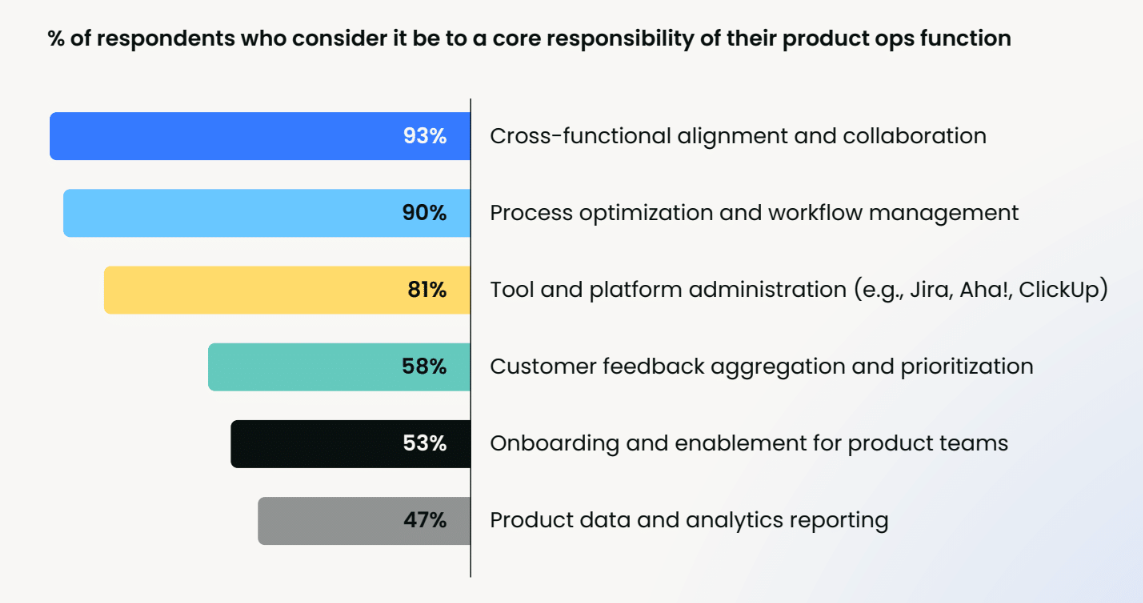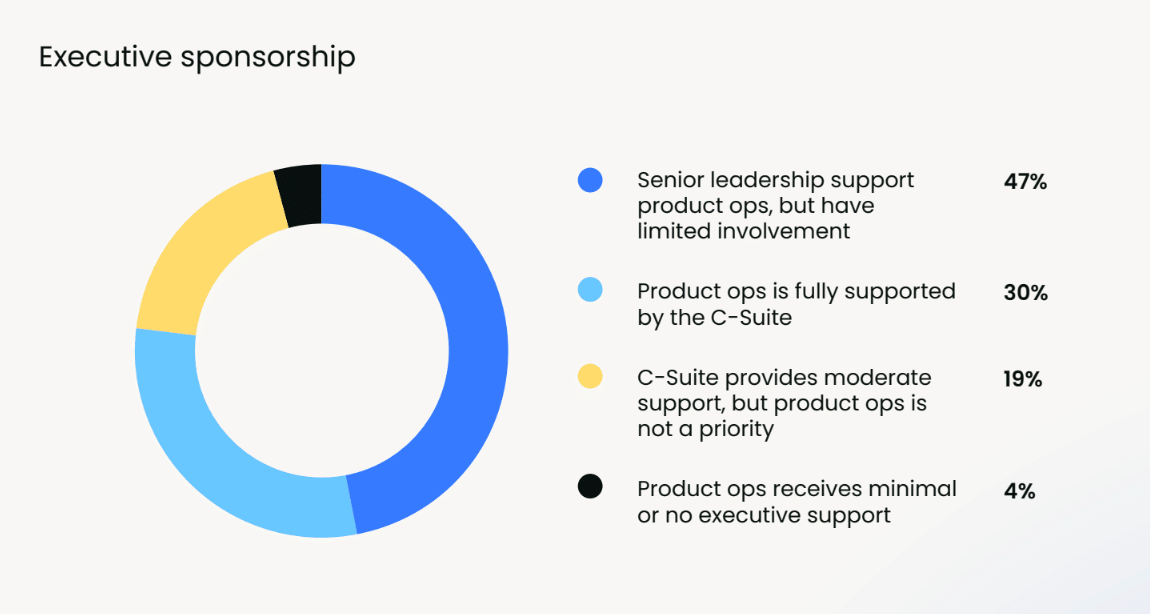Product operations is a function in transition. Over the last 3 years, it's evolved from an emerging discipline into the connective tissue of many product-led organizations. No longer confined to Silicon Valley tech giants, product ops is now increasingly viewed as a strategic backbone that enables teams to experiment faster, scale efficiently, and drive customer-centered innovation across industries.
What is product operations (product ops)?
In simple terms, product ops is best thought of as the strategic function that bridges product development with organizational execution. In other words, it's the system that ensures product teams can focus on building great products while maintaining alignment with business objectives, customer needs, and operational excellence.
Mature product ops functions provide the frameworks, processes, and infrastructure that enable product managers, engineers, designers, and stakeholders to collaborate effectively at scale. Practitioners collaborate closely with cross-functional teams, including product managers, engineers, designers, and marketing specialists, to streamline workflows, optimize resource allocation, and enhance overall product quality.
Topher Fox, Director of Product Operations at Aerospike, puts it like this:
A dedicated product operations function allows product managers and leaders to reduce their cognitive load around how product teams function. Without product ops, all of your product managers and leaders now have an additional product that they take care of: the product operating model of that organization.
What are the key responsibilities of product ops?
The remit of product operations is multifaceted, and depends on internal company priorities and structures. In our 2025 State of Product Operations report, we asked respondents what they considered to be the core responsibilities of the function.

There is, however, considerable consensus around the core responsibilities of the function, with the role crystallizing around several key areas.
Cross-functional collaboration is widely considered to be the primary priority by practitioners. The consensus reflects product ops' foundational role as the connective tissue between product, engineering, marketing, and customer-facing teams. The function's ability to break down silos and ensure coordinated execution toward shared objectives has become its defining characteristic.
Below, you can see which departments are prioritized for collaboration by product ops practitioners.

Process optimization and workflow management follows closely at 90%, reinforcing the view that product ops exists primarily to eliminate friction and create repeatable frameworks for product development.
Tool and platform administration is another core responsibility, pointing to product ops' critical role in managing the increasingly complex technology stack that enables modern product teams. From roadmapping platforms to analytics tools, product ops has become the steward of the infrastructure that allows teams to collaborate effectively and make data-driven decisions.
However, despite strong consensus around some responsibilities, our data reveals significant variation in how practitioners view other responsibilities. Customer feedback aggregation and prioritization, while important, is considered core by only 58% of respondents.
Similarly, product team enablement and onboarding ranks at 53%, indicating that while valuable, this responsibility may be shared with other departments across the company.
Most surprisingly, product data and analytics reporting is viewed as core by less than half of practitioners at 47%, likely reflecting the presence of dedicated analytics teams in larger organizations rather than diminishing the importance of data-driven decision making.
This distribution of priorities reveals a function that has found its footing in coordination and process excellence, while still defining its boundaries with adjacent disciplines like data analysis and customer research.
Product ops' evolution from support to strategic partner
The most significant trend in product ops is its evolution toward strategic impact. According to our research, practitioners are increasingly focused on wider strategy and broader business impact.

- 42% of practitioners expect to become strategic partners driving business outcomes within one year
- Only 32% plan to remain focused purely on operational efficiency
- 15% are taking on broader responsibilities like customer success alignment
This shift reflects product ops moving beyond process optimization to become what Clare Hawthorne calls "the internal customer champion and strategic driver of business outcomes."
Building experimentation infrastructure
One of the most compelling developments is product ops' role in enabling rapid experimentation. Modern ops leaders are building what can be described as "experimentation engines" that include:
- Feature flagging and release tools: Systems allowing teams to toggle features for user segments and run A/B tests without heavy deployments.
- Unified data and analytics pipelines: Centralized platforms where experiment results can be measured in real-time, eliminating analysis lag.
- Automated feedback loops: Integration of user feedback channels directly into the experiment cycle for faster iteration.
- Experimentation playbooks: Standardized guidelines ensuring experiments are run consistently with documented learnings.
How are product ops teams structured?
The structure and composition of product operations teams is emerging as one of the most critical factors determining their success. Our 2025 research reveals clear patterns in how high-performing organizations are approaching team building. These insights offer valuable guidance for leaders looking to establish or scale their product ops capabilities.
Centralized vs. distributed models
The overwhelming preference for centralized product ops teams (adopted by 76% of established functions) points to a striking shift in how organizations view the discipline.
This centralized approach enables product ops to maintain a holistic view across all product initiatives, standardize processes that might otherwise fragment across teams, and create consistent interfaces between product development and other organizational functions.

What does this tell us? Well, firstly, organizations have learned from early experiments with embedded approaches. While embedded product ops professionals may develop deeper relationships with specific product teams, they often struggle to drive organization-wide improvements or prevent the kind of process fragmentation that centralized teams excel at addressing.
Graham Reed, Head of Product Operations at HeliosX, observes:
[Centralized operations provide] a holistic view to standardise and drive interoperability for all teams, and think more about how businesses see the product division—as one, not a set of teams.
The emerging hybrid model
Among the most sophisticated organizations, hybrid models are beginning to emerge, representing 24% of established teams. These structures typically combine centralized strategy and standard-setting with distributed execution, allowing organizations to capture the benefits of both approaches.
Hybrid models often feature centralized teams that establish frameworks, tools, and processes while deploying liaisons, or embedded specialists, to work closely with specific product teams or business units.
The evolution toward hybrid models reflects the growing complexity of product organizations and the recognition that one-size-fits-all approaches may not serve diverse product portfolios effectively. Organizations implementing hybrid structures report improved responsiveness to team-specific needs while maintaining the strategic oversight and consistency that centralized models provide.
Team composition and role clarity in product ops functions
Despite clear trends emerging, there remains significant diversity in how organizations structure their product ops teams internally, suggesting the discipline is still defining its specialized roles.
Some organizations focus on roadmap enablement, with team members dedicated to establishing planning processes and managing cross-team dependencies. Others emphasize business analysis, utilizing team members with strong analytical skills to extract insights and fuel decision-making across product and business functions.
Product launch specialists represent another common archetype, working closely with both technical teams and corporate stakeholders like finance, legal, and tax to operationalize new products across multiple teams. Meanwhile, customer voice specialists act as intermediaries between users and product teams, systematically identifying and prioritizing user pain points in collaboration with UX research functions.
Is product ops receiving executive sponsorship?
One of the strongest predictors of product ops success is the level of executive sponsorship the function receives. According to survey data from our State of Product Ops report, 48% of dedicated teams report directly to the Chief Product Officer, while 30% receive full C-suite support. There's room here to grow, of course, but this executive backing is proving crucial not just for resource allocation, but for legitimizing the function's authority to drive organizational change.

Executive sponsorship becomes particularly important because product ops often needs to challenge existing processes, request changes from busy product teams, and coordinate across functions that may have competing priorities. Without clear leadership support, product ops teams risk being marginalized or relegated to purely administrative tasks rather than the strategic enablement their organizations need.
How to build a product ops team in 2025
Building effective product ops teams requires a nuanced understanding of the skills and mindset that drive success in what is ultimately a unique, and sometimes misunderstood, role.
The most successful product ops professionals combine operational excellence with strategic thinking, technical competency with interpersonal skills, and process orientation with entrepreneurial problem-solving.
Our research suggests that effective product ops professionals share several key characteristics. They embrace ambiguity and thrive on solving open-ended problems. This is a particularly crucial trait given that many product ops challenges don't have established solutions. They demonstrate what's often called a "builder's mindset," approaching obstacles with curiosity and resilience rather than seeking predefined answers.
Communication skills prove particularly critical, as product ops professionals must work effectively with diverse stakeholders across the organization. They need to translate between technical and business audiences, facilitate difficult conversations about process changes, and build trust with teams that may initially view operational oversight as bureaucratic interference.
Graham Reed emphasizes the relationship-building aspect:
Engage with the PMs, take the initiative. Find out what they need, empathise but also understand what the business needs and is asking of them. Small changes to things that irk them will make a big difference to them, and will begin to build trust between you.
Scaling product ops functions
Our research reveals interesting patterns in how product ops teams scale over time.
While 62% of teams remained stable in size over the past year, among those that did grow, the expansion was often significant, with 11% seeing growth of over 50%. This suggests that organizations tend to make substantial investments in product ops rather than growing incrementally.
However, scaling product ops teams requires careful consideration of the function's unique characteristics. Unlike product management, where adding team members can directly increase feature development capacity, product ops value comes from coordination and standardization — benefits that can actually decrease if teams become too large or fragmented.
Product ops team archetypes
Roadmap enablers
Product operations can focus on enabling product management through developing rituals and systems to build and operate at scale. Roadmap enablers can work to:
- Establish and maintain a product planning process.
- Streamline decision-making across tech and business stakeholders.
- Develop governance around screens, web pages, and processes.
- Identify and manage multi-team, multi-month, or multi-product line dependencies.
- Collaborate with peers, share tools and expertise that amplify the impact of product operations.
Business analysts
The business analyst product ops team can utilize their analytical skills to extract and transform insights, and fuel product and business decision-making. The business analysts can take charge of:
- Setting up and maintaining business intelligence and experimentation solutions.
- Bridging the gap between technical and non-technical stakeholders.
- Curating, organizing, and documenting product operations data and reporting environments.
- Collaborating with data engineering teams to expand data access and availability.
Product launchers
The product launchers have expertise in business operations and analytics, and they work to operationalize new products across multiple teams. They work closely with tech teams and corporate stakeholders such as finance, legal, and tax to:
- Achieve roadmap alignment.
- Build go-to-market strategies.
- Design experiments and launch products.
- Ensure functional partners are aligned on key objectives for the product.
- Track core business metrics related to the product.
Voices of the customer
These act as a medium between users and product, sifting through user channels to identify and stack-rank user pain points. They work closely with the UX research team to understand and interpret customer needs, as well as:
- Build temporary custom solutions for clients,
- Communicate product changes and launches with customer-facing teams.
- Collaborate with product teams on the feasibility of products throughout the product lifecycle.
- Identify key problem areas and/or geographies that will be impacted by the product launch.
- Scoping out possible solutions to address these issues.
Product ops will continue to evolve and so to will these archetypes. Some will likely merge into a unified identity similar to product management while maintaining certain specializations across teams.
What are the biggest challenges facing the product operations function?
Despite its maturation, product ops faces persistent challenges:

Role clarity
29% of practitioners struggle with unclear roles and responsibilities: the no.1 challenge across all team types. This reflects the function's position at the intersection of strategy, execution, and coordination.
Chris Butler, Product Ops Manager at GitHub, notes:
The key to avoiding confusion is proactive communication and strong relationships. If you're doing good work but no one knows where you fit, the problem isn't just your scope—it's your story.
Automation maturity is still low
While 58% of teams report positive impact from AI tools, only 7% have achieved high levels of automation. However, 43% expect AI and automation to be central to the function's three-year future.
Measurement gaps persist
21% of teams still lack formal ways to measure effectiveness, though this has improved significantly since 2023. Among those measuring success:
- 54% use product team satisfaction scores
- 37% track cross-functional collaboration ratings
- 28% measure time-to-market improvements
What does the modern product ops tech stack look like?
Based on practitioner preferences, the most valuable tools for product ops teams are:

Essential tools (ranked by priority)
- Workflow Management (34.6% rank as #1 priority) - Jira, Asana, ClickUp
- Roadmapping Tools (25% rank as #1) - Productboard, Aha!, Roadmunk
- Analytics & Dashboards (19.2% rank as #1) - Amplitude, Mixpanel, Tableau
- Collaboration Tools (17.3% rank as #1) - Slack, Notion, Confluence
- Feedback Collection (3.8% rank as #1) - Pendo, UserVoice, Zendesk
Emerging Technology Priorities
When asked about emerging technologies, practitioners are most excited about:
- Automation of repetitive tasks (36%)
- Advanced data analytics and predictive insights (23%)
- AI and machine learning for decision-making (19%)
The future of product operations
As product ops continues evolving toward more strategic impact, successful team building increasingly requires forward-looking perspective.
Organizations building product ops teams today must balance current operational needs with future strategic aspirations. This means hiring professionals who can execute immediate process improvements while also having the strategic mindset to evolve the function toward business partnership. It requires investing in automation capabilities and data infrastructure that will enable more sophisticated analysis and insight generation.
Most importantly, it demands a commitment to continuous evolution. As Chris Butler from GitHub notes, "Product ops shouldn't feel like an internal compliance function; it should feel like a force multiplier." Building teams that achieve this multiplier effect requires ongoing investment in capabilities, clear mandate for driving change, and the organizational support needed to challenge existing approaches in service of better outcomes.
Key opportunities for product ops teams
The future landscape for product operations is defined by two distinct but interconnected opportunity sets: internal organizational impact and external customer-facing influence.
Understanding these opportunities and their relative importance provides crucial insight into how the function will evolve and where leaders should focus their strategic investments.
Internal opportunities
The internal opportunities for product ops reflect the function's continued evolution from operational support toward strategic enablement. Enhancing cross-functional collaboration emerges as the primary opportunity, and this emphasis on collaboration reflects a deeper organizational reality: as product teams scale and business complexity increases, the informal coordination mechanisms that work in smaller organizations begin to break down. Product ops is uniquely positioned to build the systematic approaches needed to maintain alignment at scale.
Another key opportunity for practitioners is in the systematic adoption of AI tools and in improving data accessibility. This dual focus suggests that leading product ops teams see technology and data as complementary forces for driving organizational capability rather than separate initiatives. Organizations that successfully integrate these priorities are likely to achieve significant competitive advantages through faster decision-making and more sophisticated analytical capabilities.
External opportunities
The external opportunities reveal product ops' emerging role in directly influencing customer outcomes rather than simply enabling internal teams. Enhancing customer feedback loops dominates this category reflecting a fundamental shift in how organizations think about the function's scope and impact.
This focus on feedback loops represents more than just process improvement. It signals product ops' evolution toward becoming the organization's systematic voice of the customer.
These opportunity patterns reveal a function in transition from operational efficiency toward strategic market impact. The most successful product ops teams are likely to be those that can simultaneously excel at internal coordination while building sophisticated customer insight capabilities. This dual focus requires a broader skill set than traditional operations roles, combining process excellence with market understanding and strategic communication abilities.
Get the State of Product Operations Report 2025
If you want to see all the data and insights from out latest Product Ops report, get your free copy right here:



 Follow us on LinkedIn
Follow us on LinkedIn



